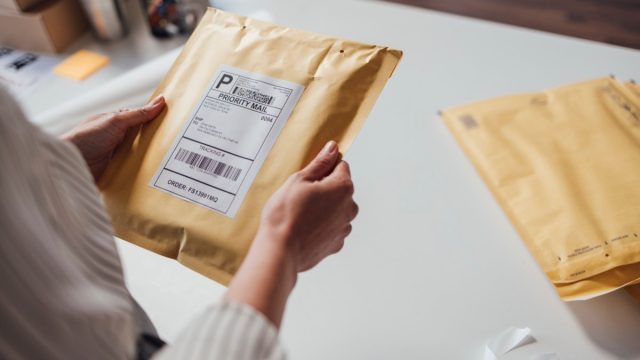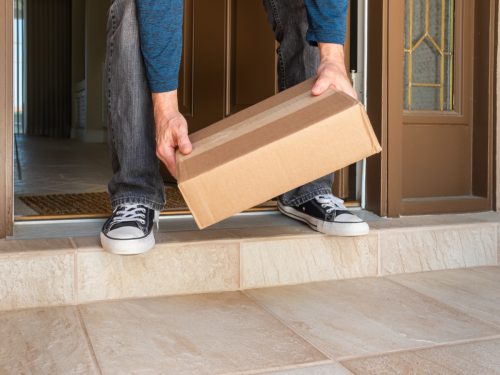Never Return a Package Before Doing This, Police Say in New Warning
Don't be too hasty, or you may end up the victim of a costly scam.

Almost all of us have returned a package for one reason or another—whether the product inside didn't match our expectations or we were simply sent the wrong item. According to NPR, there were more than $500 billion worth of packages returned by U.S. shoppers last year alone. When there's that much money at stake, thieves are bound to be lurking. Now, police are alerting Americans to a package scam that is striking people unexpectedly and doing serious damage. Read on to find out why officials say you should think twice before returning a package.
READ THIS NEXT: If You Find This on the Ground, Don't Pick It Up, Police Say in New Warning.
Police have recently sent a number of mail-related warnings to Americans.

Con artists are looking to target people however they can, and mail is often the easiest option.
Back in June, a sheriff in Avoyelles Parish, Louisiana, alerted residents about a fraudulent warranty coverage warning being sent out. According to the official, scammers were attempting to convince victims that they were being contacted by the sheriff's office and had to pay in order to prevent a lapse of coverage.
And earlier this month, police in Washington state posted on Facebook about a scam flier being sent to residents in the mail, urging them to send a check donation to a "Police Officers Support Association." According to the authorities, victims believe they're donating to their local police, but no money actually goes to the department.
Now, police have a new warning about something that may suspiciously show up in your mail.
Officials are warning about a package scam.

On July 25, the Sabine Parish Sheriff's Office in Many, Louisiana, posted on their official Facebook page, warning those in the area about a scam that had already tried to target one of their own. The department shared a notice from consumer advocate website Clark Howard, alerting people about an intricate package scam that "involves fraudulently ordered electronics being returned to criminals rather than to a legitimate retail shipping address." According to Clark Howard, scammers have used both UPS and FedEx for this scheme.
"Please be on alert," the sheriff's office wrote on Facebook, noting that the scam also applies to packages from the U.S. Postal Service (USPS). "A local Sabine Parish resident was almost a victim."
RELATED: For more up-to-date information, sign up for our daily newsletter.
This scheme involves a number of steps.

This multi-layered scam starts with thieves ordering products with stolen credit card information and sending them to the residence of the card holder, according to Clark Howard. For instance, The Plain Dealer in Cleveland, Ohio, reported that a man in the area had received a $600 laptop from Best Buy via UPS that had been fraudulently bought using his wife's credit card number.
A few days later, FedEx showed up to the couple's home with a shipping label and instructions to pick up the computer to return to Best Buy, despite the man having returned it to a local Best Buy store the day before. According to The Plain Dealer, the address on the return shipping label was not a Best Buy location, but instead for a residential street address—which is all part of the scammer's ploy.
"So the m.o. of the criminals is this: They order expensive electronics on a stolen credit card and have the purchases shipped to the home of the legitimate credit card holder. The criminals expect that the card holder will become preoccupied with disputing the purchase with their bank," Clark Howard explains. "That's when the crooks strike a second time by sending a return label and package in which the item is supposed to be shipped back to the retailer."
You should always check the return address before sending back a package.

Shannon Mortland, a spokeswoman for PNC Bank, told The Plain Dealer that fraud investigators "are familiar with this scheme," and that the street address being used is typically just a part of the overall con. "Scammers recruit 'reshipping mules' whose sole function is to receive packages and reship them to another destination," Mortland said. "They are often recruited under the guise of 'work-from-home' opportunities (another realm of fraud scams)."
If the package is being returned to an address used by scammers, it's not getting sent back to the retailer. As a result, "the retailer may hold you financially responsible for the cost of the stolen merchandise," Clark Howard warns.
"The scammers count on the cardholder not paying attention to the return shipping address," Mortland told The Plain Dealer. "Often the cardholder is so preoccupied with reversing the transaction that they fail to realize that they are, in fact, not returning the merchandise directly to the merchant."
That's why you should always pay attention to where you're sending a package—even if you're returning something you didn't order in the first place. "Never return something you didn't order without first verifying that it's a legitimate address to which you're return shipping," Clark Howard reiterates.





















